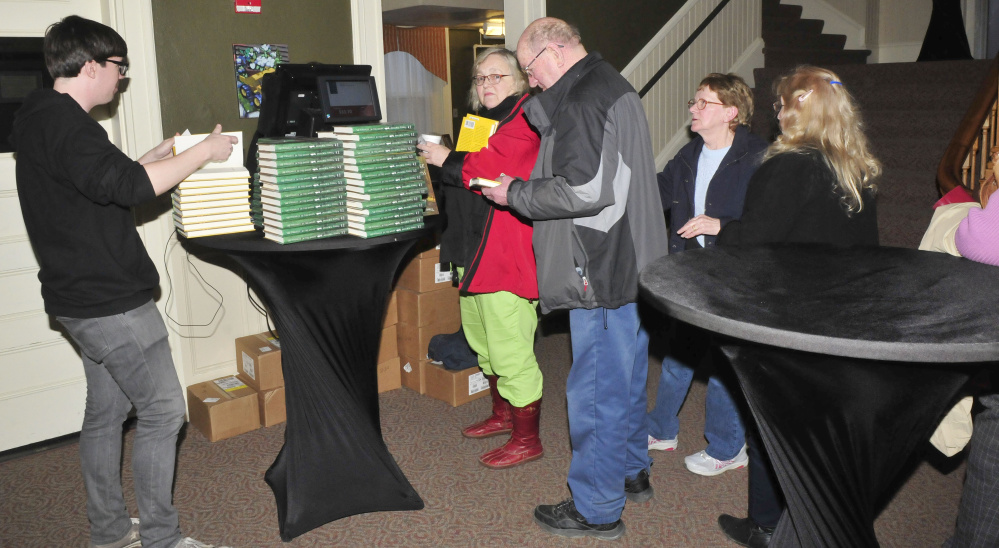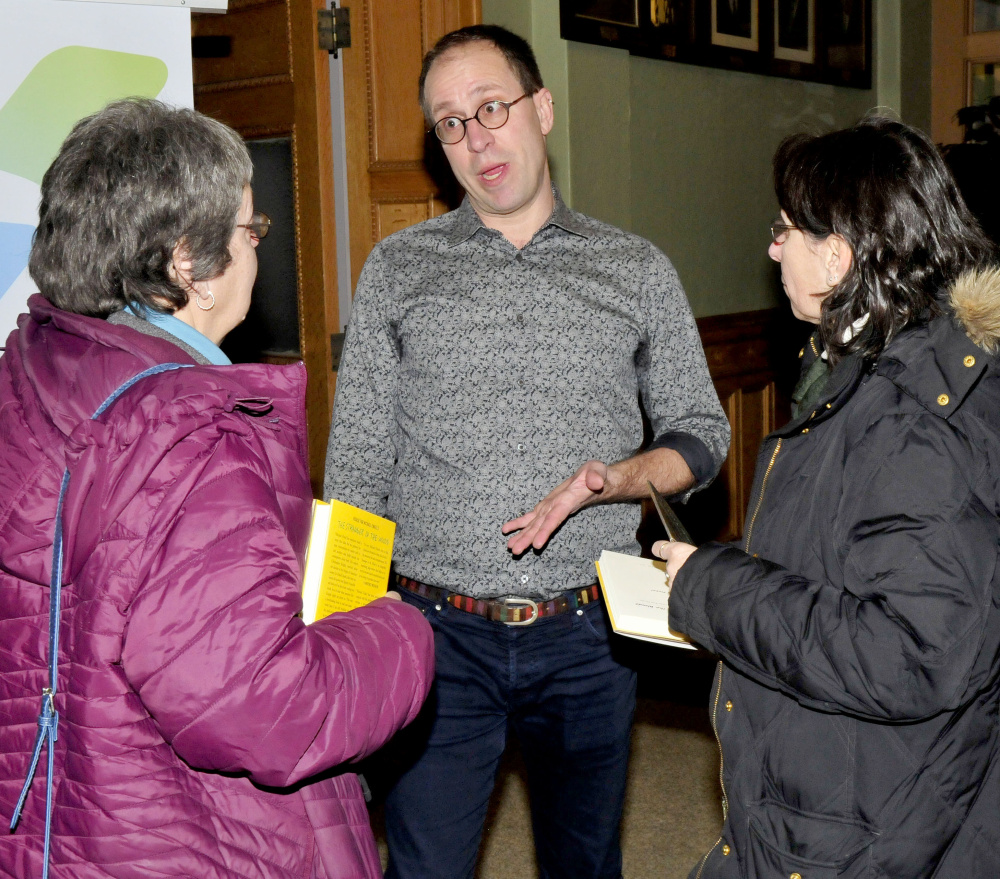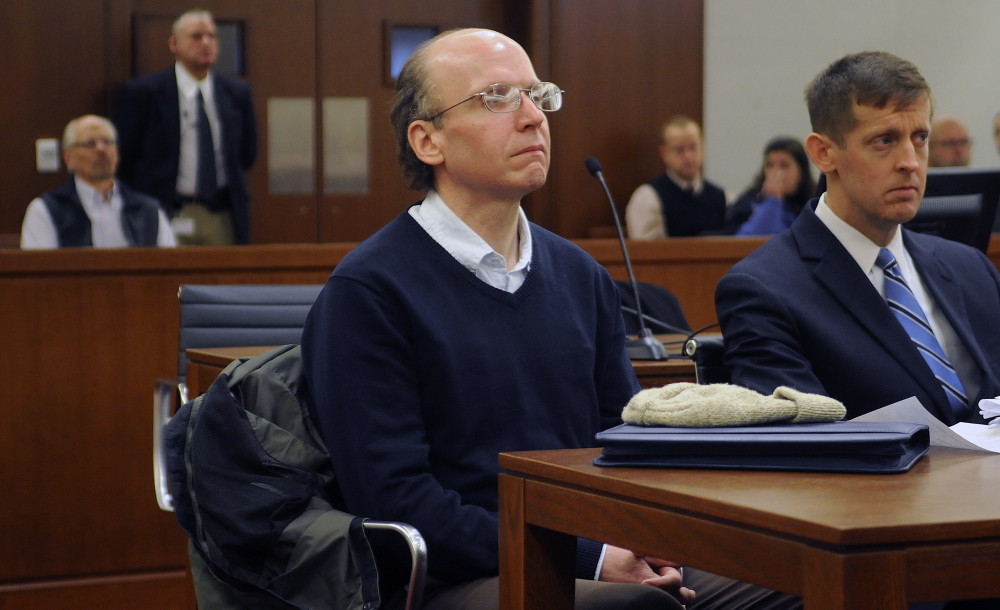WATERVILLE — The man who lived alone in the Rome woods for 27 years, living on food and other necessities he stole from camps and cottages, was extremely intelligent, read a lot and had a keen sense of humor.
Not many people got a glimpse into the mind of the reclusive, quiet Christopher Knight, known to many as “the North Pond hermit,” but author Michael Finkel did.
Finkel, of Bozeman, Montana, shared tidbits about Knight on Thursday to a captive crowd at the Waterville Opera House who came to hear him speak about his new book, “The Stranger in the Woods: The Extraordinary Story of the Last True Hermit,” based on Finkel’s experiences with Knight after the man’s capture in 2013.
Finkel said 500 journalists tried to interview Knight, but he was the only writer who managed actually to speak to him, and they corresponded through letters while Knight was in jail.
“The Stranger in the Woods” was published this year by Penguin Random House.
Finkel told more than 400 people who packed the Opera House that he was intrigued by how Knight was able to survive 27 years alone in the woods and why he did so. Using a slideshow that included police photographs of Knight’s campsite in the Rome woods, Finkel told the story of how he came to know Knight and write the book.
He said he realized from Knight’s letters that Knight was bright and had an amazing vocabulary and a good sense of humor. For instance, Finkel had told him in one letter that he was a fan of Ernest Hemingway, and he found Knight’s response amusing.
“He said, ‘I feel rather lukewarm about Hemingway,'” Finkel said, to laughter from the audience. “And he said that he preferred Rudyard Kipling.”
Finkel spoke with police, Knight’s crime victims and others before writing the book. He spoke with those who did not believe it possible for Knight to live alone without ever getting sick or seeing a doctor. Finkel said he spoke with doctors who said he probably was able to avoid sickness because he never came in contact with people.
“He wasn’t around other people and didn’t have any germs,” he said.
Finkel said he asked Knight how he managed to avoid freezing to death. Knight told him, and Finkel details this in his book, that at 2:30 a.m. in winter, he would get up and pace the perimeter of his campsite for hours and melt snow for water. Knight said he also was careful to avoid being detected by walking on stones and avoiding walking on snow, which would leave footprints.
“I never found any evidence that Chris Knight lied to me,” he said. “The story is hard to believe, but it’s also true.”
It is unknown what Knight’s reaction is to Finkel’s book — if he has read it.
Knight did not respond to a message and business card left recently by a Morning Sentinel reporter on the door of his Albion home, nor did he reply to a letter written and mailed to him by the newspaper in late February.
But Finkel told the reporter before his talk Thursday that he mailed Knight a copy of the book.
“His response was what I expected — nothing,” Finkel said.
He said he also mailed a copy of the story he wrote about Knight for GQ magazine to Knight, and Knight told him there were parts about it he liked and parts he did not, but “he respected it.”
“It is my strong belief that he will respect the book,” Finkel said.
Asked if he plans to send Knight any proceeds from the book, Finkel said he did not. He said he has donated more than $2,000 to Pine Tree Camp, from which Knight stole over the years; and he intends to continue donating to that camp, which serves disabled children and adults. Finkel also said he has had no contact with Knight since the last time he saw him, a meeting he details in the book.
The book recounts Knight’s life of solitude, during which he stole food, clothing, propane tanks, sleeping bags, toilet paper and other necessities from camps and cottages on North and Little ponds during the night and evaded capture by police and game wardens.
Knight, now 51, was arrested April 4, 2013, at Pine Tree Camp in Rome, by Sgt. Terry Hughes, of the Maine Warden Service, and Maine State Trooper Diane Perkins-Vance, who are featured in Finkel’s book. Hughes had long sought to nab the elusive burglar. The North Pond hermit had been the subject of storytelling and legend in the area for nearly 30 years, becoming a nightmare for camp owners who for many years had tried unsuccessfully to catch him in the act.
When he was apprehended, Knight was trying to steal food and tools from Pine Tree Camp. At the time, he told Perkins-Vance that he had not spoken to his family since the mid-1980s and everything he owned, except his eyeglasses, he had stolen.
Knight’s arrest, which was first reported by the Kennebec Journal, quickly drew nationwide attention.
Knight completed a specialty court program for people with substance abuse and mental health problems. He already had served seven months in jail and then pleaded guilty to committing 13 burglaries and thefts in Rome and Smithfield — a mere fraction of the estimated 1,000 he had committed over the years. He served seven months in jail and was ordered to serve three years of probation.
Finkel’s 200-page book details his efforts to reach out to Knight when Knight was incarcerated at the Kennebec County jail,
Finkel sent handwritten letters to Knight and Knight reciprocated, offering bits and pieces of who he was in terse notes. Finkel then traveled from Montana to visit Knight in jail, unannounced, thus beginning a series of several other visits that did not stop after Knight was released.
Knight, Finkel writes, “told me his story and asked for nothing in return, but he admits that he wonders which version of him I will portray” and ultimately concluded, “‘Do what you think is right.'”
Finkel again traveled from Montana to visit Knight at his mother’s home in Albion, where Knight was staying. Finkel makes no bones about the fact that during his final visits, Knight insisted he stay away and leave him alone.
Toward the book’s end, Finkel describes his growing concern that Knight — apparently unable to adapt to life outside the woods — would commit suicide, citing what Knight reportedly called a walk with “the Lady of the Woods,” an allegorical reference to death. Later, Finkel writes that Knight sent him one last letter, instructing him to buy flowers for his wife, spend time with his kids and never come back to see Knight “for now and then hence.” Finkel took that as an optimistic sign.
On Friday, Finkel will speak at the Bangor Public Library; and on Saturday, at the Owl & Turtle Bookshop in Camden, before heading to other New England states. After that, he is scheduled to speak in New York, Washington, Oregon and other places on the West Coast.
Finkel also is author of “True Story: Murder, Memoir, Mea Culpa,” a true story about man on the FBI’s most wanted list who was captured and found to have taken on the identity of Finkel, who was then a writer for the New York Times Magazine. The book also explains how Finkel was fired from The Times Magazine for weaving interviews from different people together to create a composite character in a story he wrote about child labor in Africa. The book later was made into a movie.
In “The Stranger in the Woods,” Finkel does not hide the fact that he was prohibited from writing for some publications because of what he had done. He writes in Chapter 8 that he disclosed to Knight in a letter he wrote to him in jail “that I was a flawed journalist.”
“Maybe the admission that I was a sinner within my profession, while Knight was a confessed thief, unable to live in solitude without pilfering from others, would engender a sense of connection — both of us striving, and failing, to achieve lofty ideals,” Finkel writes.
He also emphasizes that he had fact-checkers review “The Stranger in the Woods.”
In the audience Thursday night were Waterville Senior High School teachers Sherry Brown and Alice Rush-Rhodes.
An English teacher, Brown said after Finkel’s talk that she had used his GQ story about Knight in her creative writing class. She said Knight’s is an amazing story with a local connection — and many people can relate to the desire to want to leave society at some point in their lives.
Finkel’s presentation Thursday was comprehensive, Brown said, adding that she found it interesting that he did not read from his book as most authors do at such events.
“What’s interesting is that it was almost an elegy to Christopher Knight,” she said.
A social studies teacher, Rush-Rhodes concurred, saying she was intrigued not only by Knight’s story, but also by Finkel’s pursuit of the “why” and “how” of Knight’s experience. Did he decide one day to just exit society or did he plan it, she wondered aloud.
“I was curious when he initially left, did his family think he was a missing person?” Rush-Rhodes said. “Did they know he was done being in society?”
Thursday’s event was sponsored by Waterville Public Library, Waterville Opera House, Waterville Creates!, Bull Moose Music, the city of Waterville, Penguin Random House, the Colby College Center for Arts & Humanities and the Mid-Maine Chamber of Commerce. Tammy Rabideau, business, career and creativity coordinator at the library, introduced Finkel.
Before Finkel spoke, he introduced Troy Bennett, who played banjo and sang a song he had written about the North Pond hermit, asking the audience to sing along.
Amy Calder — 861-9247
Twitter: @AmyCalder17
Send questions/comments to the editors.









